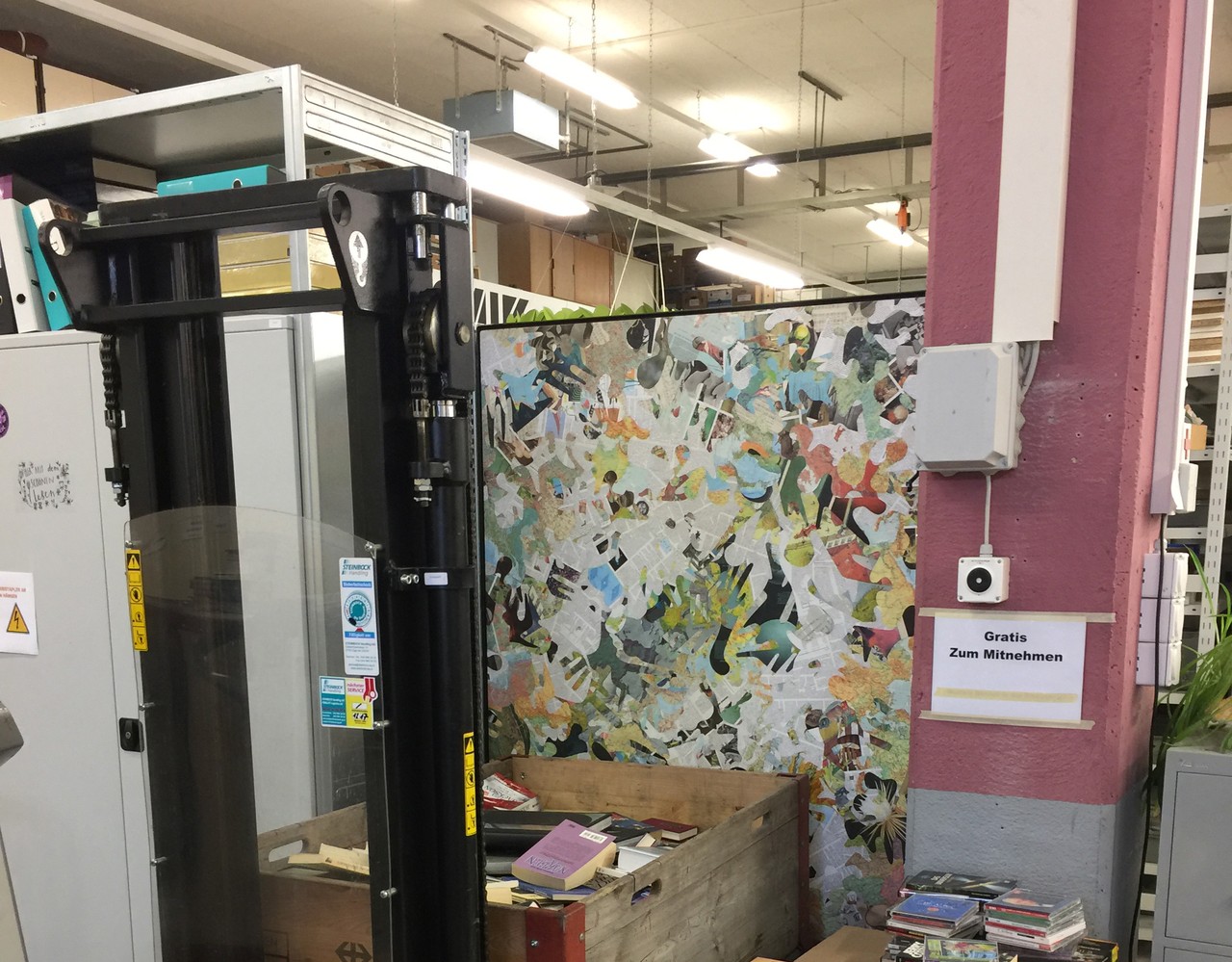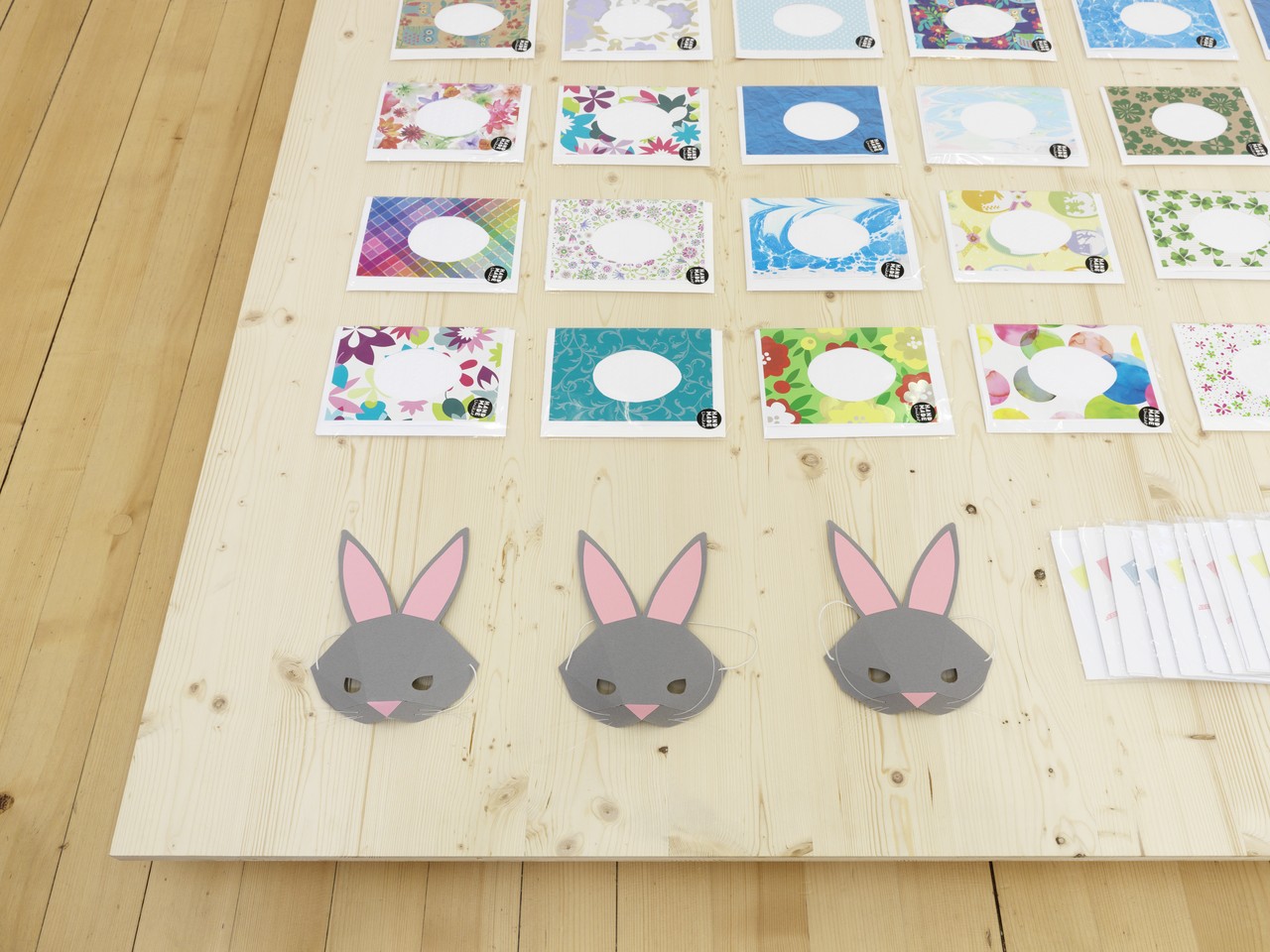As Mountain Winds
Mitchell Anderson
12 Nov 2017 - 21 Jan 2018
AS MOUNTAIN WINDS
Mitchell Anderson
12 November 2017 - 21 January 2018
Curator(s): Balthazar Lovay
Mitchell Anderson is interested in the circulation of ‘memory objects ‘and recontextualises, in exhibition spaces, objects he purchases outside the usual economic circuits. For example, he buys Hollywood relics and talismans at auction or US Army propaganda that he then exhibits. In 2015, he also began buying entire stands from souvenir or gadget sellers that he met in major tourist cities (Marrakesh, Rome, Bern, Hong Kong). These consumer objects are all industrially produced, often in Asia. By displacing them in this way, he points to the contrast between mass production and the informal economy whose existence these sellers, their stands and their wares display for all to see. Here, mass production puts an individual workforce at its service, lending goods an authentic, ‘craft ‘image, their stands often being veritable temporary, DIY constructions. Once placed in an art space they raise both artistic and social questions.
At the beginning of 2017, in order to receive unemployment insurance benefits, Mitchell Anderson had to take part in an ‘employment incentive program’ set up for the unemployed in Zug, the canton where his visa was issued when he arrived in Switzerland in 2008. In a creative workshop, alongside colleagues, over a period of three and a half months full time, he had to create several series of decorative objects, all by hand using traditional craft techniques. These items were subsequently put on sale in Halle44, a shop affiliated with the program in Baar. The ‘employment incentive program’ thus gave an astonishing twist to the artist’s situation:
Anderson found himself being forced to take part in a craft activity and a form of imposed creativity.
He decided to examine these contradictions and push them to their limits. At the end of the program, he introduced himself as a customer at Halle44 and bought some of the objects that he and his colleagues had manufactured, exactly in the same way as he would have bought this stock from a street vendor.
The exhibition as mountain winds presents these about 180 objects in the two rooms on the first floor at Fri Art. They are presented in a very neutral way and take on the role of witnesses of the whole process in the course of which questions raised by readymades meet those regarding the circulation of goods in different economic settings, whether this be the shadow or informal economy. Their appropriation by the artist opens a wide field of questioning on the activity of the artist, readymades, modes of production, distribution and exhibition, the circulation of goods, new economic circuits and the symbolic value of objects.
Over the last hundred years, readymades have created a true artistic language whose grammatical scope has not yet been fully exhausted. In fact, such virtually canonised appropriation practices have infinite possibilities. Many artists have played with and manipulated the three elements that are readymades, economic functioning and art spaces.
In turn Anderson appropriates the concept of readymades by shattering their very nature. Until now, readymades have almost always been mass-produced objects recovered by artists. Historically readymades have been related to the emotional disinvestment of artists who remove themselves from the process of the material fabrication of the work, in opposition to traditional artistic know-how. In the present case, Anderson brings these two components together while placing them back to back. The artist did indeed create these objects with his own hands, but as part of an imposed task and outside of his artistic practice. To take possession of them, he considered them as objects exogenous to his practice, and purchased them in a shop. Thus, they truly became a ‘work of the artist’ through this process of acquisition and the conceptual decision taken by the artist. These objects, these ‘Hand-made Ready-made’ or ‘Artist-made Ready-made’ objects as defined by Anderson, clearly surpass any ordinary classification.
These craft objects reflect strong societal issues and raise the question of the rethinking of the place of the individual in the world of work. However above all, he puts his finger on a general misunderstanding linked to the conception of creativity. Like other commonplaces, the word ‘creativity’ has become a portmanteau word that is both meaningless and entirely fetishized. The ‘employment incentive program’ generously held up the concept of creativity for participants, while confining it to a strict framework. The unemployed were made to follow models, patterns and processes that had been cautiously selected beforehand. The idea that creativity would help the unemployed find a job, but that ‘creativity’ should exist simply through the manual manufacture of original objects, is based on a misunderstanding that generates a caricature of the notions of work but also of the creative process and artists. ‘Creatives’ is of course also a word that has come to designate advertising related professions. If there were a single approach to be avoided in one’s decisions as an artist it would indeed have to be that of being creative.
Mitchell Anderson was born in 1985 in Chicago. He lives in Walchwil and works in Zürich.
Mitchell Anderson
12 November 2017 - 21 January 2018
Curator(s): Balthazar Lovay
Mitchell Anderson is interested in the circulation of ‘memory objects ‘and recontextualises, in exhibition spaces, objects he purchases outside the usual economic circuits. For example, he buys Hollywood relics and talismans at auction or US Army propaganda that he then exhibits. In 2015, he also began buying entire stands from souvenir or gadget sellers that he met in major tourist cities (Marrakesh, Rome, Bern, Hong Kong). These consumer objects are all industrially produced, often in Asia. By displacing them in this way, he points to the contrast between mass production and the informal economy whose existence these sellers, their stands and their wares display for all to see. Here, mass production puts an individual workforce at its service, lending goods an authentic, ‘craft ‘image, their stands often being veritable temporary, DIY constructions. Once placed in an art space they raise both artistic and social questions.
At the beginning of 2017, in order to receive unemployment insurance benefits, Mitchell Anderson had to take part in an ‘employment incentive program’ set up for the unemployed in Zug, the canton where his visa was issued when he arrived in Switzerland in 2008. In a creative workshop, alongside colleagues, over a period of three and a half months full time, he had to create several series of decorative objects, all by hand using traditional craft techniques. These items were subsequently put on sale in Halle44, a shop affiliated with the program in Baar. The ‘employment incentive program’ thus gave an astonishing twist to the artist’s situation:
Anderson found himself being forced to take part in a craft activity and a form of imposed creativity.
He decided to examine these contradictions and push them to their limits. At the end of the program, he introduced himself as a customer at Halle44 and bought some of the objects that he and his colleagues had manufactured, exactly in the same way as he would have bought this stock from a street vendor.
The exhibition as mountain winds presents these about 180 objects in the two rooms on the first floor at Fri Art. They are presented in a very neutral way and take on the role of witnesses of the whole process in the course of which questions raised by readymades meet those regarding the circulation of goods in different economic settings, whether this be the shadow or informal economy. Their appropriation by the artist opens a wide field of questioning on the activity of the artist, readymades, modes of production, distribution and exhibition, the circulation of goods, new economic circuits and the symbolic value of objects.
Over the last hundred years, readymades have created a true artistic language whose grammatical scope has not yet been fully exhausted. In fact, such virtually canonised appropriation practices have infinite possibilities. Many artists have played with and manipulated the three elements that are readymades, economic functioning and art spaces.
In turn Anderson appropriates the concept of readymades by shattering their very nature. Until now, readymades have almost always been mass-produced objects recovered by artists. Historically readymades have been related to the emotional disinvestment of artists who remove themselves from the process of the material fabrication of the work, in opposition to traditional artistic know-how. In the present case, Anderson brings these two components together while placing them back to back. The artist did indeed create these objects with his own hands, but as part of an imposed task and outside of his artistic practice. To take possession of them, he considered them as objects exogenous to his practice, and purchased them in a shop. Thus, they truly became a ‘work of the artist’ through this process of acquisition and the conceptual decision taken by the artist. These objects, these ‘Hand-made Ready-made’ or ‘Artist-made Ready-made’ objects as defined by Anderson, clearly surpass any ordinary classification.
These craft objects reflect strong societal issues and raise the question of the rethinking of the place of the individual in the world of work. However above all, he puts his finger on a general misunderstanding linked to the conception of creativity. Like other commonplaces, the word ‘creativity’ has become a portmanteau word that is both meaningless and entirely fetishized. The ‘employment incentive program’ generously held up the concept of creativity for participants, while confining it to a strict framework. The unemployed were made to follow models, patterns and processes that had been cautiously selected beforehand. The idea that creativity would help the unemployed find a job, but that ‘creativity’ should exist simply through the manual manufacture of original objects, is based on a misunderstanding that generates a caricature of the notions of work but also of the creative process and artists. ‘Creatives’ is of course also a word that has come to designate advertising related professions. If there were a single approach to be avoided in one’s decisions as an artist it would indeed have to be that of being creative.
Mitchell Anderson was born in 1985 in Chicago. He lives in Walchwil and works in Zürich.


